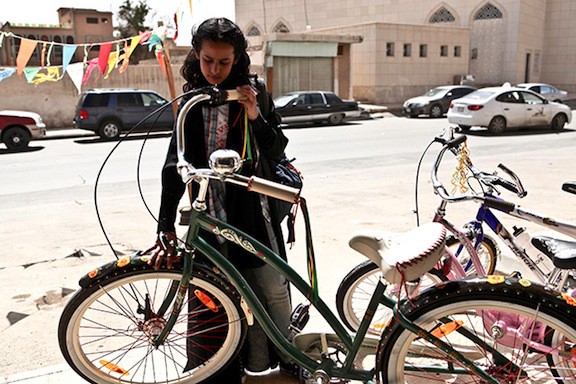Wadjda written and directed by Haifaa Al-Mansour is making its way around the world in limited release. The reviews have been spectacular, it has won festival prizes, and is also making an emotional connection as it was first film made in Saudia Arabia (which has no movie theatres) and it was made by a woman forced to direct in a van since women have many restrictions placed upon them in that country.
The film was submitted by the Ministry of Culture of Saudia Arabia to be that country’s first film in contention for the best foreign language Oscar. But the film does push boundaries about girls and women in Saudia Arabia, and so it would be naive to think that this film would not stir up at least some controversy back home where girls are not allowed to ride bicycles and women are not allowed to drive cars.
Khalaf Al-Harbi penned a column that ran in the Saudi Gazette talking about why he thought it would be a bad idea for the film to win an Oscar. As a point of information, currently, the film is just in the submissions phase and there is no guarantee of a nomination. But based on the reception around the world and the reviews and the circumstances around the film Iit probably has a really good chance of getting a nomination.
By trying to say that Wadjda should not be nominated, what Mr. Al-Harbi does is illuminate exactly why a film like this is important and has the potential to create change.
Some of his points:
the film is featuring a 10-year-old Saudi girl, named Wajda, who tries to buy a bicycle to ride it along our streets without knowing that in the Kingdom, riding bicycles is an exclusive privilege of the boys. This means that the winning an Oscar award will open discussion about the tribulations of the Saudi woman and her forced seclusion. We do not want such idle talk.
The Saudi woman is a precious jewel which is to be tightly guarded. She should not at all think of riding a bicycle. If the circumstances obliges her to ride a bicycle as a means of transport, she can recruit an Asian driver to do the job. Why do we make a problem out of nothing? The Saudi woman will never drive a car in this country so why do we keep repeating this trivial talk? Have all the problems of the Saudi woman been summarized in preventing her from driving? We have bigger problems.
I think that Ms. Al-Mansour knew exactly what she was doing and that it is not idle talk for a girl to want to ride a bicycle or for a woman to want to drive. Women are not jewels to be “guarded.” Women are people who deserve the same freedoms and opportunities as boys and men. That is exactly the point of Wadjda.






